Let us not be remembered as the generation that knew and did nothing. Let us be the generation that turned back from the brink. Before it’s too late.
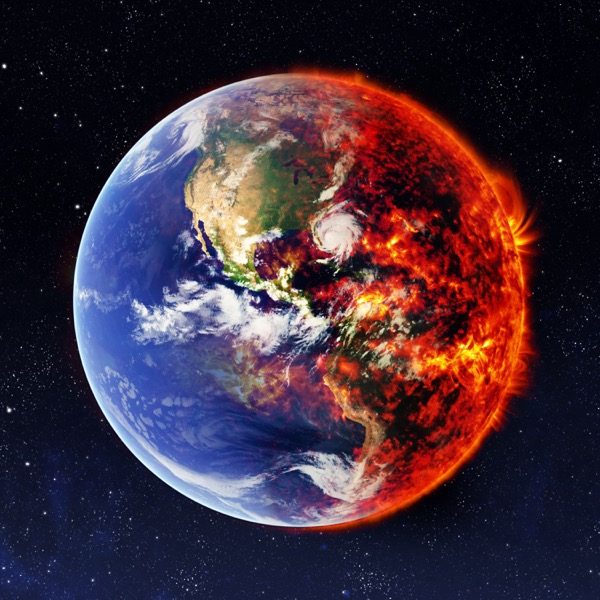
© Shutterstock
Musa Sattar, London, UK
At this very moment, the world teeters on the brink of the unimaginable.
World leaders posture with rhetoric of strength and sovereignty. Defence budgets skyrocket. Missiles fly across borders. And in underground labs and sprawling military compounds, nations polish arsenals capable of ending life as we know it.
We are not walking toward World War III; we are already in its early stages. Russia-Ukraine. Israel-Palestine. Sudan. Taiwan. Iran. USA. UK. China. The alliances are forming with new geopolitical blocs across the globe. The weapons are poised and the warnings are flashing. And yet, humanity sleepwalks forward.
For over two decades, a single voice has cried out with unwavering clarity. His Holiness, Hazrat Mirza Masroor Ahmad (aba), Worldwide Head of the Ahmadiyya Muslim Community, has warned governments, parliaments, and presidents: You are steering this world toward annihilation.
In the words of His Holiness (aba), ‘These enmities towards others are completely usurping human values and so are leading the world towards obliteration.’
He has stood before the U.S. Capitol Hill, the European Parliament, the Houses of Parliament in London, the United Nations, and various other parliaments and establishments not with condemnation but with a plea: Choose peace. Choose justice. Choose survival.
But the world did not listen.
The Science of Extinction
The dangers His Holiness (aba), described are no longer theoretical. Scientists have meticulously mapped what would follow a nuclear exchange, and the findings are unequivocal: nuclear war is not winnable. It is not containable. And it would not be survivable for most life on Earth.
The Yale Climate Connections has confirmed that even a ‘limited’ nuclear war i.e., say between India and Pakistan, would plunge the planet into a nuclear winter. Fires would engulf cities. Smoke and ash would block the sun, collapsing global agriculture. Famine would kill billions.
Steven Starr, the director of the University of Missouri’s Clinical Laboratory Science Program, and a senior scientist at the Physicians for Social Responsibility in an article published in Federation of American Scientists highlighted that nuclear winter could cause average surface temperatures to fall by up to 20°C, in some regions that is worse than the Ice Age.
The World Health Organisation estimates that the health services of every country would collapse under the weight of burns, radiation sickness, cancer, and psychological trauma. There would be no treatment. No medicine. No refuge.
In 2025, the Stockholm International Peace Research Institute (SIPRI) reported that the risk of nuclear confrontation is higher than it has been since the Cold War. Nine nations command a staggering arsenal of over 12,300 nuclear warheads. Of these, around 9,600 are held in military stockpiles, with 3,800 actively deployed and more than 2,100 locked in launch-ready alert, primed for immediate use. Some are controlled by authoritarian regimes. Many could be fired in minutes
A harrowing projection from the scientific journal Nature Food reveals that a nuclear war could trigger a famine killing over 5 billion people. The toll would be devastating where nearly 99% of people in nations like the US, Europe, Russia, and China could perish by starvation, as caught beneath a veil of black carbon smoke.
A stark 2025 study in the British Journal of Cancer issues a dire warning of ending nuclear weapons before they end us. The toxic shroud would plunge temperatures and cripple food production, leaving no time to adapt, and nowhere to run.
Even the survivors will envy the dead. That’s not hyperbole. That’s the scientific consensus.
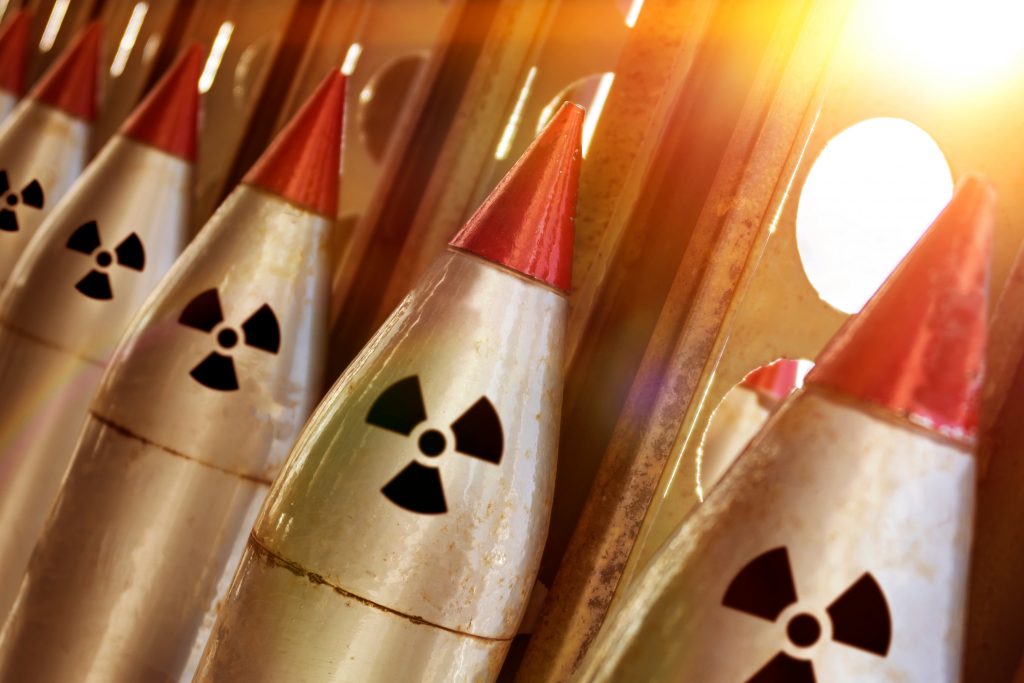
© Shutterstock
Prophetic Warnings Ignored
His Holiness, Hazrat Mirza Masroor Ahmad (aba) has warned, in words both compassionate and chilling, that ‘we are witnessing the foundations of another world war being laid before our very eyes.’ In speech after speech, letter after letter, he predicted with startling precision what analysts now admit: a Third World War is no longer a question of if, but when.
Back in 2003, mere months after becoming Caliph, he warned that the path to destruction was being paved by greed, nationalism, and the abandonment of justice.
At the British Parliament in 2008, His Holiness (aba) said, ‘It is not only the poorer countries of the world, but also the richer nations that are being affected…If the requirements of justice are not fulfilled, the conflagration and flames of these local wars can escalate and embroil the whole world.’
He foretold the consequences of economic injustice, political arrogance, and religious hatred all of which have now converged in real time. His foresight was not mystical. It was moral. Ethical. Based on human decency and historical truth.
And still, the world turned away.
World War III Has Already Begun
The idea that a world war begins with a single declaration is outdated. Historical studies of conflicts from 1946 to 2002 show that major wars typically escalate through gradual intensification rather than sudden, overwhelming strikes. Casualties accumulate not from a single blow but through prolonged escalation with annual death tolls in drawn-out wars often rising by 10 to 50 percent. Today’s conflict landscape follows a similar pattern, though it is far more diffuse. This war is fragmented and asymmetric, unfolding across cyber realms, biological threats, territorial disputes, and ideological battles. It manifests in Gaza, Ukraine, Taiwan, Sudan. It speaks in the language of sanctions, drone strikes, AI surveillance, and coordinated misinformation.
NATO research outlines a modern escalation ‘ladder,’ particularly in Russia’s military doctrine, which envisions a conflict evolving from cyberattacks to local skirmishes, expanding into regional war, and potentially culminating in nuclear strikes. As documented by the U.S. Naval Institute, both deliberate strategies and unintended incidents have repeatedly served as ignition points for large-scale escalation.
Just as World War I began with a bullet but erupted due to alliances, distrust, and imperial interests, today’s geopolitical landscape mirrors the pre-WWII tensions of the 1930s but only with far more devastating weapons. As the Carnegie Endowment warns, technological advances have made ‘limited’ nuclear conflict a gateway to global catastrophe
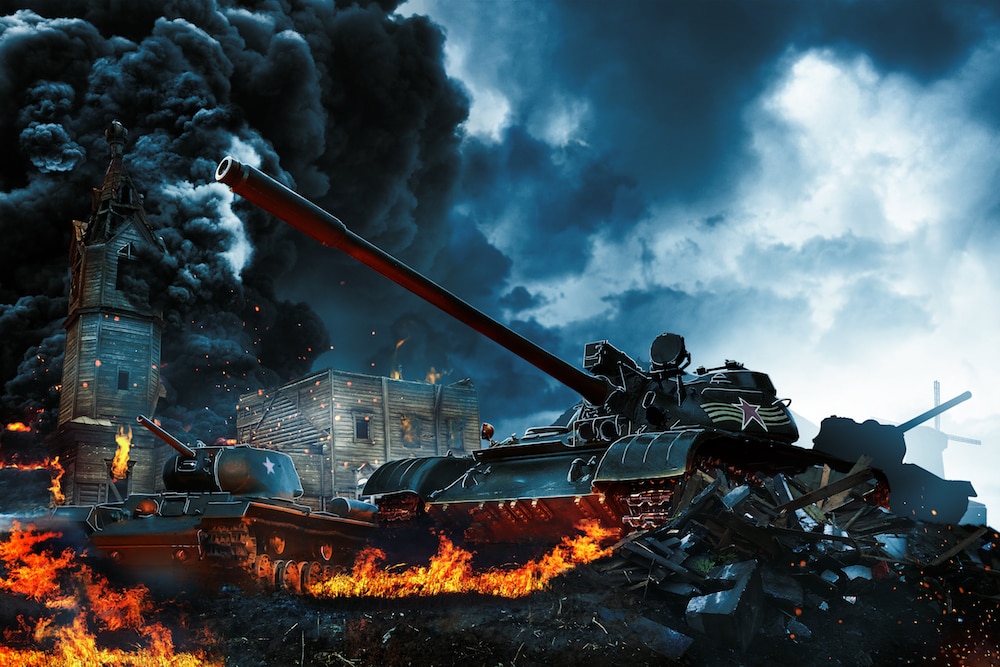
© Shutterstock
And behind this fragile facade of ‘peace,’ billions of dollars are spent daily on nuclear modernisation. According to the UK Defence Journal, this is not deterrence, it is preparation.
Against this backdrop, specialists agree almost unanimously that deploying tactical nuclear arms would almost certainly ignite an uncontrollable spiral. Analyses from Stockholm International Peace Research Institute SIPRI and Carnegie Endowment for International Peace, reinforced by decades of doctrine and recent war‑games, show that even a so‑called ‘limited’ strike can cascade into all‑out nuclear conflict. Former US Secretary of Defense James Mattis underscored this danger in 2018, stating, ‘I don’t think there’s any such thing as a “tactical nuclear weapon.” Any nuclear weapon used at any time is a strategic game changer.’ The risk is amplified by strategies such as Russia’s ‘escalate to de‑escalate,’ which assume the fallout can be contained despite evidence to the contrary.
Hazrat Mirza Masroor Ahmad (aba), described this invisible unfolding with painful clarity:
‘The severity of the situation is such that a Third World War could begin at any time – in fact in reality a Third World War has already begun on a small scale. I have been warning of this for a number of years but only now analysts and world figures have started to agree.’
No One Will Be Spared! Not Even Nature
It’s not just cities that would vanish. It’s forests, oceans, crops, bees, and birds. The International Campaign to Abolish Nuclear Weapons (ICAN) has shown that a single nuclear detonation could render entire regions uninhabitable for centuries. Radiation poisons the soil, kills pollinators, and mutates DNA and all in silent, irreversible succession.
We would watch ecosystems unravel. Famine would not only kill humans, but drive species into extinction. Insects, vital to agriculture, would perish in atmospheric shifts. Marine life would suffocate under collapsing food chains.
It will not be limited to the nations involved. The whole world will bear its burden.
As Hazrat Mirza Masroor Ahmad (aba) reminded, ‘the consequences of our actions today will reverberate through time and shape the world our children inherit from us…innocent children will be born with physical or mental disabilities. Generations will be consumed by trauma, rage and hopelessness – all because of our selfishness and failure to uphold peace and justice.’
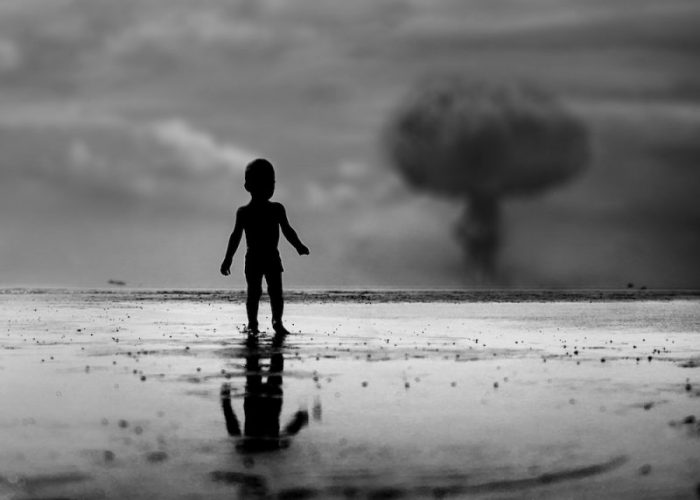
© Shutterstock
There Is a Way Out
While most warnings stop at fear, Hazrat Mirza Masroor Ahmad (aba) offers a roadmap based on justice, equity, and truth. His blueprint for peace isn’t bound to any one religion or nation. It is universal. He had provided practical solutions the world can act upon to bring about peace, justice and harmony in society.
1. Absolute Justice in International Relations
Peace cannot survive where hypocrisy flourishes. Developed nations must stop using developing nations as pawns. Justice must replace national interest.
His Holiness (aba) said, ‘It is necessary, therefore, to take practical steps to stop cruelty, regardless of whether it is the mighty or the weak that are inflicting the cruelty. Peace will not be established merely by adopting UN Resolutions; practical steps must be taken. It is necessary to establish trust and build confidence and for this absolute equality must prevail. Differences between the rich and developed and poor and developing countries must be eliminated. All forms of veto powers should be removed and the finer points of justice need to be identified. We need to be loyal to our covenants, our obligations and our status, and this loyalty can only occur when it is followed to the letter and spirit of the law; double standards should be eliminated.’
2. Global Economic Reform
Instead of enslaving nations through debt or plundering their resources, rich countries must empower the poor: investing in infrastructure, education, and dignity.
In one of his lectures delivered at the Roehampton University of London, His Holiness (aba) emphasised that,
‘The developed countries should help the developing world to gain economic independence. They should assist them so that they are able to utilise their own resources to enable them to stand on their own feet and thus strengthen their economy. When each country looks at another country and each nation looks at another nation as an equal, the thought will never come to mind that we have to monopolise the market. They will never think that they have to only help the poor nations so that they do not perish or when they are about to die, they announce some economic aid and inject a temporary boost of assistance and publicise by saying that look here how much aid has been given to the poor nations. …Till this way of thinking changes, unrest and lack of peace will continue to be the hallmark of the world.’
3. Fair Mediation in Conflicts
The UN must shed its bias and become a true peacebroker, not a tool of superpower politics. Vetos must be abolished and dialogue must come before drones and diplomacy over destruction, every time.
Addressing more than 550 Ambassadors of State, Members of Parliament, and academics representing 30 countries at the National Peace Symposium UK, Hazrat Mirza Masroor Ahmad (aba) said,
‘The objective should always remain to build sustainable peace underpinned by justice. It should not be that a third party take advantage of the vulnerability of the warring parties by usurping their rights for his own benefit. If this principle were observed at the United Nations and other relevant bodies, conflicts would be resolved far more amicably and swiftly. However, it will prove impossible for true peace to emerge so long as nations, either directly or through their powerful allies, can utilise a veto power. Regrettably, due to its inherent lack of justice, the fate of the United Nations seems set to mirror that of its failed predecessor, the League of Nations. And if the system of international law, weak as it may be, completely collapses, the resulting anarchy and destruction is beyond our comprehension.’
In the same address he further said,
‘We must all come together, setting aside national, political, and other vested interests for the greater good of humanity and to ensure that we leave behind a prosperous world for our future generations. It is the need of the time that we must focus all our energies and efforts on establishing true peace so that we may live in a world of hope and prosperity rather than a world defined by inequality, hatred, and bloodshed.’
4. Spiritual and Moral Awakening and Recognising God
Without a transformation of the human heart, treaties are temporary. His Holiness (aba) calls on humanity to return to compassion, humility, and the recognition of a higher purpose.
In his groundbreaking address, His Holiness (aba) outlined a blueprint for long-lasting peace and provided a detailed geo-political analysis of the world crisis delivered at the Annual Convention Germany held in Karlsruhe. He said,
‘At this critical moment in history, I believe with all my heart that there is only one way to bring an end to the great challenges of our time. There is only one path that can lead us to salvation and deliver us from this world of war and conflict and that is the path of God Almighty. Peace does not lie in power or wealth, rather peace lies in the cradle of God Almighty.’
On many occasions underscoring the power of religious values in protecting freedom of religion or belief, His Holiness (aba) highlighted the fundamental importance of belief in God in bringing about true peace.
In 2022 at the global conference of Ministerial for Freedom of Religion and Belief held in London, His Holiness (aba) reminded all attendees, including those who may not believe in God, that,
‘True freedom and lasting peace in the world is not possible until mankind comes to recognise his Creator, fulfils His rights and acts upon His commandments…Whether religiously inclined or not, we must recognise that there is One God, who is the Creator and in Whose Hand lies all of creation, and so it is our duty to fulfil His rights and that of all humanity.’
5. Interfaith and Interethnic Harmony
His Holiness (aba) has called on all people, Muslim, Christian, Hindu, atheist, to see beyond division.
Addressing an audience of more than 125 dignitaries and guests in Holland, he gave a critical message,
‘A golden principle given by the Founder of Islam (peace and blessings of Allah be upon him) is that a true Muslim should like for others, what he likes for himself.’
In his letter to His Holiness Pope Francis in 2020, Hazrat Mirza Masroor Ahmad (aba) wrote,
‘Given the precarious times through which we are now passing, I have deemed it necessary to also write to you to convey my belief that it is the foremost obligation of today’s religious leaders to guide mankind towards the reality that this virus is a grave warning to humanity and that the only escape route is to bow down in all humility before our Creator, to fulfil His rights and to fulfil the rights of one another so that the world may be transformed from its current desperate state into a haven of peace, love and compassion.’
Addressing to the audience at the reception of an inauguration ceremony of the Baitul Hamid Mosque in Fulda, Germany, he reminded that God has granted man logic and understanding, so we should treat others better than the way animals treat one another. By doing so, we value one another even more.
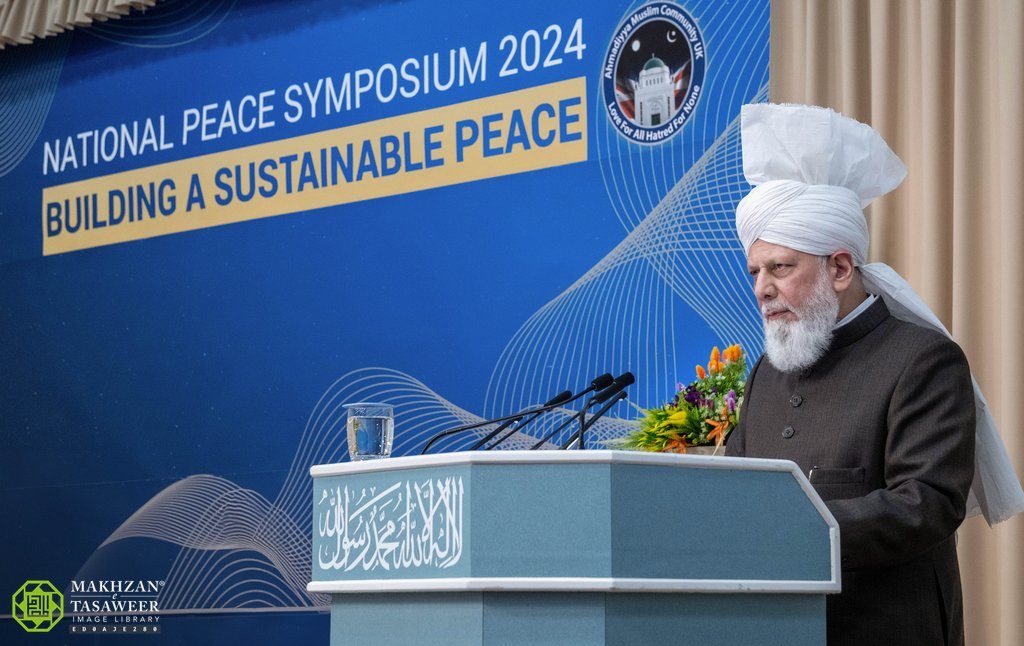
His Holiness, Hazrat Mirza Masroor Ahmad (aba), Worldwide Head of the Ahmadiyya Muslim Community
© Makhzan-e-Tasaweer
The Last Choice We Still Get to Make
The facts are brutal: a single round of nuclear fire would darken the sky, freeze the fields, and leave billions with nothing to eat. From the International Atomic Energy Agency to the Bulletin of the Atomic Scientists, experts around the world agree: there is no such thing as a safe or limited nuclear war. Scientists have provided evidence that ‘there is no survivable dose of nuclear war.’ In fact, the biophysical and geopolitical reality is that nuclear warfare (tactical or strategic) guarantees species-level catastrophe.
So here is the choice that matters more than any moonshot: will we pour our money and imagination into keeping this world alive, or will we watch it burn while our rockets chase dead planets? In the current fragile scenario, our Earth’s future is at stake. Our most important mission right now is planetary survival.
In the words of His Holiness, Hazrat Mirza Masroor Ahmad (aba), ‘There is only one path that can lead us to salvation and deliver us from this world of war and conflict and that is the path of God Almighty. Peace does not lie in power or wealth, rather peace lies in the cradle of God Almighty.’
The clock is loud now. Either we trade fear for justice today, or we hand our children a ruined sky. There is no Planet B and no second warning. The only frontier worth racing toward is a peaceful Earth.
About the Author: Musa Sattar has an MSc in Pharmaceutical Analysis from Kingston University and is also serving as the Assistant Manager of The Review of Religions and the Deputy Editor of the Science & Religion section.

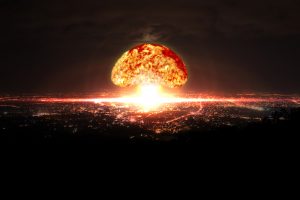


Add Comment